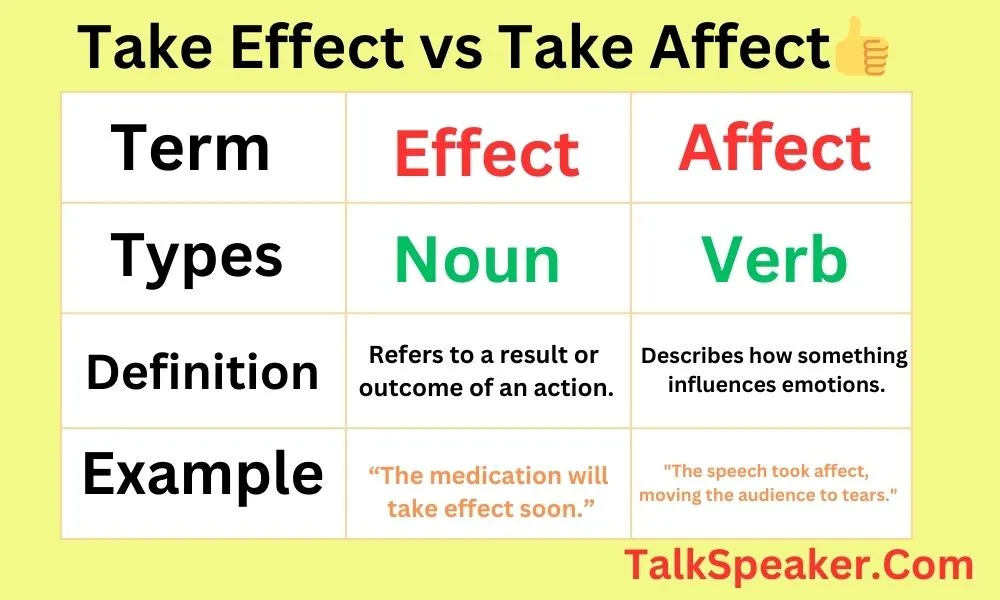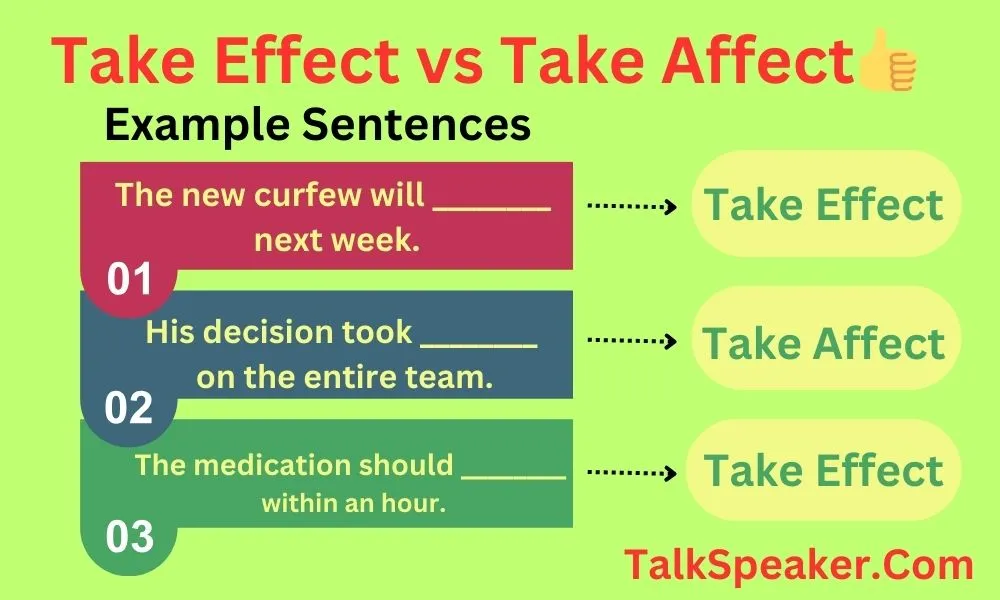Last updated on October 27th, 2024 at 06:27 am
The phrases “take effect” and “take affect” are often a source of confusion due to their similar sounds and proximity in meaning.
These terms, though closely related, are fundamentally different and serve specific purposes in the English language.
If you’ve ever wondered which phrase to use in writing or speech, you’re not alone.
In this comprehensive guide, we’ll explore the precise meanings of “take effect” and “take affect,” their correct usage in everyday language, and tips to remember the difference.
Confused about when to use “take effect“ vs. “take affect“? You’re not the only one! While they sound similar, “take effect” means something is starting to work, like a new rule or medicine, and “take affect” is about emotions or changes in behavior.
In this simple guide, you’ll learn how to easily tell them apart with examples and tips.
Avoid common mistakes and get it right every time!
Let’s Jump in and clarify this common confusion once and for all.
What Do “Effect” and “Affect” Mean?
Before understanding the phrases “take effect” and “take affect,” it’s essential to break down the individual words: effect and affect.
These two terms often cause confusion because they sound alike but differ in both meaning and function within a sentence.

Effect (Noun)
- Definition: Effect refers to the result or outcome of a particular action or cause.
- Example: “The medication will take effect soon.”
- Explanation: In this sentence, the term “effect” refers to the result or impact of taking the medication.
Affect (Verb)
- Definition: Affect is a verb that describes how something influences or changes something else, particularly in terms of emotions or actions.
- Example: “The speech took affect, moving the audience to tears.”
- Explanation: In this sentence, “affect” refers to the influence of the speech on the audience’s emotions.
The Key Distinction
- Effect = The outcome or result of an action (noun).
- Affect = The emotional or psychological influence on something (verb).
Common Contexts for “Take Effect”
Now that we’ve covered the meanings of “effect” and “affect,” let’s explore how the phrase “take effect” is used in different contexts.
“Take effect” is often used to describe the point when something begins to have an impact or starts producing results.
1. Medicine and Health
One of the most common uses of “take effect” is in the medical field. When you take a medication or undergo treatment, there’s usually a delay before the desired results are observed.
This delay is when the medication is said to “take effect.“
- Example: “The painkillers will take effect in about 30 minutes.”
- Explanation: In this sentence, the painkillers need time to start working, so the effect is delayed but expected.
Case Study: Pain Relief Medication
Let’s say a patient takes a prescribed medication for chronic pain. The doctor advises that the medication will take about 20 minutes to “take effect.”
This means that after 20 minutes, the patient should begin to feel relief. The concept of “taking effect” is common in medicine, as drugs usually need time to metabolize before they begin to work.
2. Laws and Policies
“Take effect” is also widely used in legal and governmental contexts.
New laws, policies, or regulations often have a set date when they officially start being enforced. This is when they “take effect.”
- Example: “The new tax law will take effect on January 1st.”
- Explanation: This sentence refers to the start date of the new law, marking when it becomes enforceable.
Table: Upcoming Laws Taking Effect in 2024
| Law/Policy | Description | Effective Date |
|---|---|---|
| Data Privacy Act | New rules for online data protection | March 15, 2024 |
| Climate Tax Reforms | Tax incentives for eco-friendly companies | July 1, 2024 |
| Minimum Wage Increase | Nationwide raise in minimum wage rates | January 1, 2024 |
This table highlights several examples of laws that are scheduled to “take effect” in 2024.
3. Natural Processes
In nature, events or changes are often said to “take effect” once they start influencing the environment.
This usage can apply to weather patterns, climate changes, or even biological processes.
- Example: “The drought warning will take effect by the end of the month.”
- Explanation: The warning doesn’t immediately apply but will become valid once conditions deteriorate.
Common Contexts for “Take Affect”
Unlike “take effect,” the phrase “take affect” is used less frequently but refers to emotional or psychological influence.
Let’s explore some common scenarios.
1. Emotional or Psychological Impact
“Take affect” is often used to describe the emotional influence that something has on an individual or group.
- Example: “The tragic news took affect on the community, leaving many in shock.”
- Explanation: In this sentence, the phrase describes how the news emotionally impacted the community.
Case Study: Public Speeches
Imagine a motivational speaker addressing a large audience. As the speech unfolds, the crowd’s mood shifts from neutral to inspired.
This is an example of the speech “taking affect” on the audience, altering their emotional state.
2. Behavioral Changes
Behavioral psychology often uses “take affect” to describe how emotions and moods lead to a change in behavior. When something “takes affect,” it is influencing thoughts, feelings, or actions.
- Example: “His anger began to take affect, making him act irrationally.”
- Explanation: The emotion of anger influenced his behavior, showcasing how feelings can directly impact actions.
3. Use in Psychological Studies
In the context of psychological research, “take affect” is commonly found in studies examining emotional responses.
Researchers might describe how a certain stimulus “took affect” on participants by influencing their emotional state.
How to Remember the Difference Between “Take Effect” and “Take Affect”
For many people, distinguishing between these two phrases can be tricky.
Luckily, there are simple ways to remember which one to use.
Mnemonic Devices
- Effect = End Result: Think of “effect” as the outcome of something that happens. It’s what you get after a process has completed.
- Affect = Action on Emotions: Remember that “affect” is a verb and is about influencing something, particularly feelings or emotions.
Grammar Tip: Noun vs. Verb
Another easy trick to differentiate between “take effect” and “take affect” is to remember their grammatical roles:
- Effect is usually a noun.
- Affect is usually a verb.
If you can replace the word with “result,” you’re likely dealing with “take effect.”
If you’re referring to influence or emotions, “take affect” is the correct choice.
Real-Life Examples
It’s always helpful to see real examples. Below is a list of sentences where you can try to determine whether “take effect” or “take affect” is correct.

Example Sentences
- “The new curfew will ________ next week.”
- “His decision took ________ on the entire team.”
- “Once signed, the contract will ________ immediately.”
- “The tragic news took ________ on everyone in the room.”
- “The new medication should ________ within an hour.”
Correct Answers:
- take effect
- take affect
- take effect
- take affect
- take effect
By practicing with these types of sentences, you can sharpen your ability to use the correct phrase every time.
Common Mistakes and How to Avoid Them
Many people mistakenly swap “effect” and “affect” because they sound so similar.
To avoid these mistakes, always ask yourself:
- Is the sentence describing a result or impact? If so, use “take effect.”
- Is the sentence talking about emotional influence? If so, use “take affect.”
List of Common Errors:
- Incorrect: “The new rule will take affect on Monday.”
- Correct: “The new rule will take effect on Monday.”
- Incorrect: “The sad movie took effect on me.”
- Correct: “The sad movie took affect on me.”
Quick Tips for Proofreading:
- Read your sentence aloud to see if “result” or “influence” fits better.
- Use grammar-checking tools to help catch these errors automatically.
Common Queries
1. Can “affect” ever be used as a noun?
Yes, in psychology, “affect” can be a noun, meaning an emotional expression or mood.
However, this is a specialized use.
2. Is “take affect” a common phrase?
No, “take affect” is less common and is mostly used in specific psychological or emotional contexts.
3. Can “effect” be a verb?
Yes, “effect” can be a verb, meaning to bring something about (e.g., “to effect change”).
This is different from “take effect,” which is a phrase.
4. What’s a good way to remember “effect” vs. “affect”?
Think of “effect” as an end result, while “affect” is about influencing emotions.
5. Why do people often confuse these words?
Because they sound similar and are sometimes used in similar contexts, it’s easy to confuse them.
Knowing the grammatical role they play helps clarify their usage.
Conclusion
Understanding the difference between “take effect” and “take affect” boils down to knowing when you’re referring to a result or an emotional influence.
While “take effect” is more common in contexts like medicine and law, “take affect” is used when describing emotional or psychological influence.
By practicing with examples, applying mnemonic devices, and proofreading your work, you’ll avoid confusing these two phrases. The next time you’re faced with the dilemma of choosing between “effect” and “affect,” you’ll know exactly what to do.

As an experienced English teacher, I’m Jessica Thompson, here to make grammar and vocabulary simple and fun. Join me on TalkSpeaker as we explore the language together, one lesson at a time!



